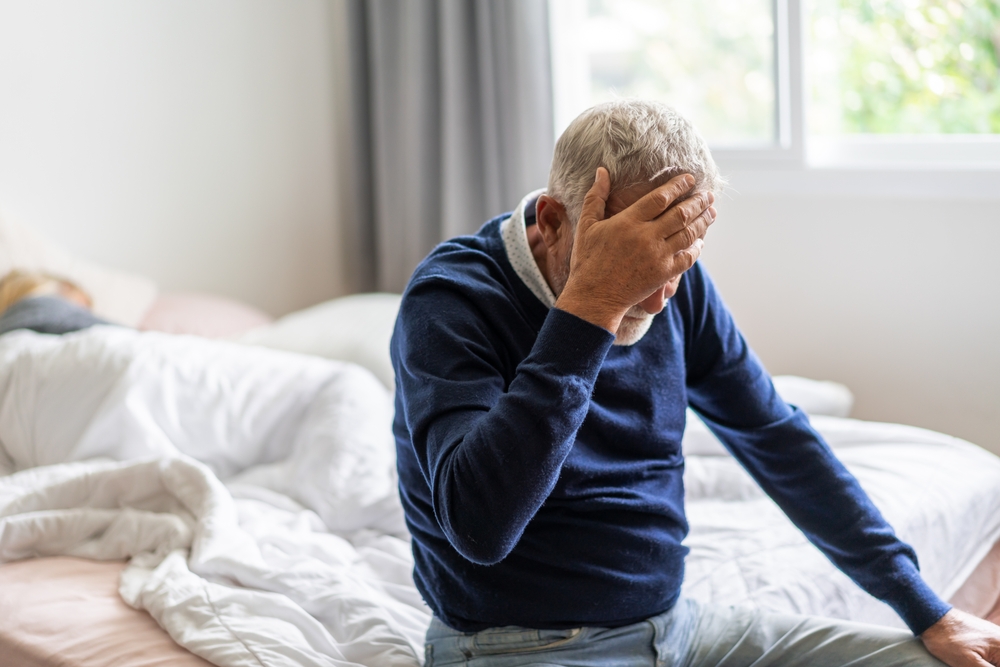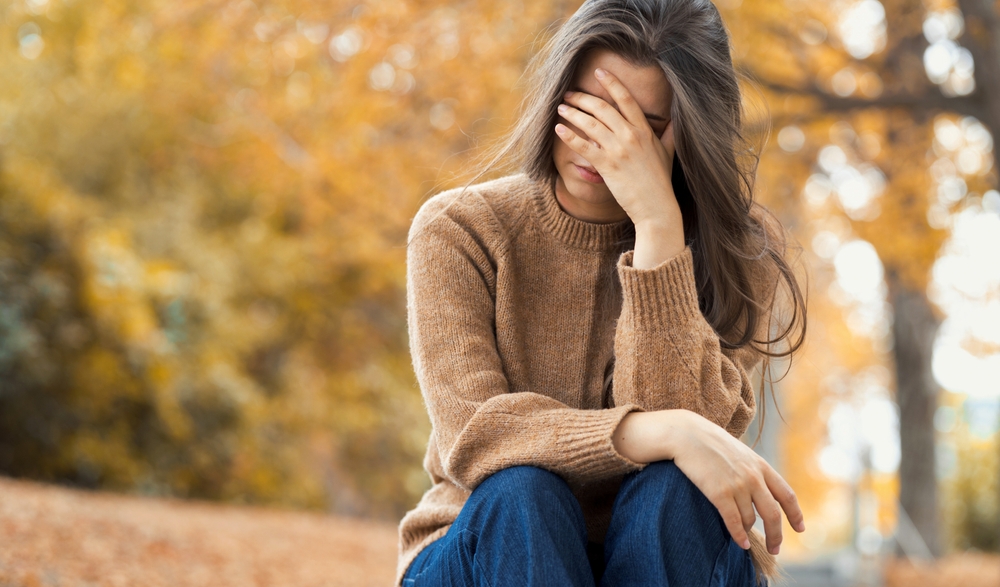Last Updated:
May 27th, 2025
Depression and Addiction | Signs and Support Options
What is classed as depression?
We all go through rough patches in our lives, and when low mood sets in, it’s hard to ignore. But when does a low mood cross the line into something more? With the stigma around depression lifting in recent years, more people are recognising the signs, yet it can still be difficult to know if what you’re feeling is depression or just a tough time.
Think of the common cold. It has clear symptoms, and because it’s widely understood, people can recognise it and take action without much second thought. Depression, however, has long been shrouded in misunderstanding. While it also has distinctive symptoms, they aren’t always as well-known or easy to identify.
That’s why understanding these signs and reaching out for support if you recognise them, is so important.

Common symptoms of depression
According to the DSM-5 (Diagnostic and Statistical Manual of Mental Disorders, Fifth Edition), major depressive disorder is diagnosed when at least five or more of the following symptoms occur most of the day, nearly every day, for at least two weeks. One of these symptoms must be either depressed mood or loss of interest/pleasure.
- Depressed mood
- Loss of interest or pleasure
- Changes in appetite or weight
- Sleep disturbances
- Fatigue or loss of energy
- Psychomotor agitation or retardation
- Feelings of worthlessness or excessive guilt
- Difficulty concentrating
- Thoughts of death, self-harm or suicide
If you feel as though any of the symptoms resonate with you or someone you love, it’s crucial to reach out to a healthcare professional for further help.
Is there a link between depression and addiction?
Depression and addiction often go hand in hand but figuring out which one came first isn’t always straightforward. It is a bit like the chicken and the egg paradox: does depression lead someone to substance use, or does addiction create the conditions for depression to develop?
In many cases, the two feed into each other, making it difficult to separate one from the other.
Depression leading to addiction
When someone is struggling with depression, life can start to feel overwhelming. Everyday tasks become harder and even things that once brought enjoyment no longer seem to matter. In an effort to cope, they might start drinking more, relying on medication outside of its intended use or turning to substances that provide a temporary sense of relief.
At first, it might seem like it helps. Just a small escape from the heaviness of daily life. But over time, that relief becomes something they depend on. The occasional drink to lift the mood turns into a regular habit or the extra dose to sleep at night starts feeling necessary every day. While it may have started as a way to manage feelings, it can quickly develop into something much harder to control.
Addiction leading to depression
Addiction does not always begin with the intention of escaping something. Sometimes it starts as a way to relax, fit in socially or manage stress. However, as use becomes more frequent, it can begin to take priority over other aspects of life. Relationships, work and hobbies slowly start to slip away.
As the cycle continues, the emotional toll of addiction can take shape in the form of depression. Feelings of guilt and isolation become more common and what once felt like a source of relief now feels like part of the problem. The more someone struggles to regain control, the harder it can be to see a way forward.
What is a dual diagnosis of depression and addiction?
When someone is struggling with both depression and addiction, it is known as a dual diagnosis. This simply means that two conditions are present simultaneously, and while that might sound daunting, it is a good thing to know. A dual diagnosis ensures that both issues are treated properly rather than one being overlooked, which can make recovery far more effective in the long run.
Understanding both conditions is key to creating the right treatment plan. If someone were to receive treatment for addiction without addressing underlying depression, they may find that certain therapies do not work as well.
Likewise, if depression is treated without recognising a substance addiction, the person might continue using substances in a way that worsens their mental health. By identifying both, treatment can be tailored to ensure the right balance of care.
Once a dual diagnosis is confirmed, treatment is designed to support both conditions together. This often involves a mix of therapies and sometimes medication where necessary. The focus is on understanding how these conditions interact and providing strategies to manage both effectively.
This personalised approach helps people not only overcome addiction but also develop healthier ways to cope with depression, reducing the risk of relapse.

How would depression and addiction be treated in a rehab centre?
Rehab primarily focuses on overcoming addiction but many of the therapies used also help with depression. If depression is left unaddressed, it can make staying sober more difficult, while addiction can make it harder to manage mental health. That is why rehab programmes often incorporate therapies that support both addiction recovery and emotional well-being.
Therapies beneficial for both addiction and depression
What are the next steps?
Addiction and depression can feel overwhelming, but you don’t have to face them alone. At Addiction Helper, we provide expert guidance and support to help you take the first step toward recovery. Call today for confidential advice and find the right treatment to regain control of your life.
Our compassionate team are ready and available to take your call, and guide you towards lasting the lasting addiction recovery you deserve.
Frequently Asked Questions
(Click here to see works cited)
- Faris LH, Gabarrell-Pascuet A, Felez-Nobrega M, Cristóbal-Narváez P, Mortier P, Vilagut G, Olaya B, Alonso J, Haro JM, López-Carrilero R, Domènech-Abella J. The Association Between Substance Use Disorder and Depression During the COVID-19 Lockdown in Spain and the Moderating Role of Social Support: a Cross-Sectional Study. Int J Ment Health Addict. 2023;21(2):1157-1167. doi: 10.1007/s11469-021-00651-7. Epub 2021 Sep 27. PMID: 34602912; PMCID: PMC8475446.
- Gautam M, Tripathi A, Deshmukh D, Gaur M. Cognitive Behavioral Therapy for Depression. Indian J Psychiatry. 2020 Jan;62(Suppl 2):S223-S229. doi: 10.4103/psychiatry.IndianJPsychiatry_772_19. Epub 2020 Jan 17. PMID: 32055065; PMCID: PMC7001356.
- McCool MW, Mochrie KD, Lothes JE, Guendner E, St John J, Noel NE. Dialectical Behavior Therapy Skills and Urges to Use Alcohol and Substances: An Examination of Diary Cards. Subst Use Misuse. 2023;58(11):1409-1417. doi: 10.1080/10826084.2023.2223283. Epub 2023 Jun 16. PMID: 37328431; PMCID: PMC11172370.
- Shakeri J, Ahmadi SM, Maleki F, Hesami MR, Parsa Moghadam A, Ahmadzade A, Shirzadi M, Elahi A. Effectiveness of Group Narrative Therapy on Depression, Quality of Life and Anxiety in People with Amphetamine Addiction: A Randomized Clinical Trial. Iran J Med Sci. 2020 Mar;45(2):91-99. doi: 10.30476/IJMS.2019.45829. PMID: 32210485; PMCID: PMC7071554.

